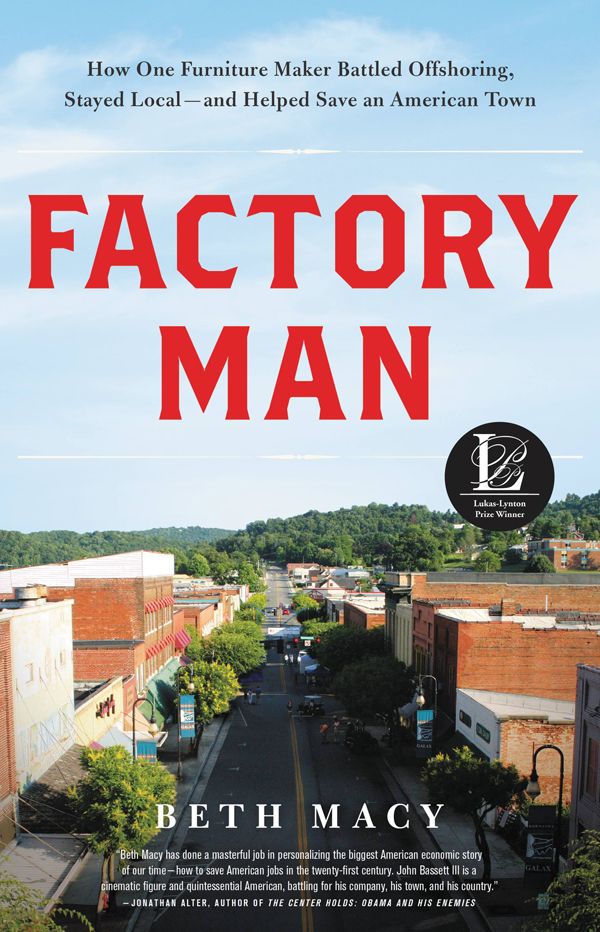
Factory Man
How One Furniture Maker Battled Offshoring, Stayed Local--and Helped Save an American Town
کتاب های مرتبط
- اطلاعات
- نقد و بررسی
- دیدگاه کاربران
نقد و بررسی

Starred review from March 17, 2014
In her first book, winner of the 2013 J. Anthony Lukas Work-in-Progress Award, Roanoke Times reporter Macy explores the effects of globalization on America’s furniture manufacturing industry via the story of the Bassetts, a family from Virginia, whose Bassett Furniture Company was once the world’s largest producer of wooden furniture. In the 1980s, cheap Chinese imports began to flood the U.S. market, prompting many domestic furniture makers to move their factories abroad. But John Bassett III fought back. A “larger-than-life rule breaker,” J.B. III (as he was known) hired top trade lawyer Joe Dorn and convinced members of the U.S. furniture manufacturing industry to support him in filing a petition against China for unfair trade practices, ultimately saving his company, Vaughan-Bassett (an offshoot of the family business), along with hundreds of jobs. Macy’s riveting narrative is rich in local color. It traces the history of the Bassett family and the U.S. furniture trade, from the “billowing smokestacks” of Southern towns along Route 58 to the imposing factory complex near Dalian, China, and eventually to Vietnam and Indonesia, where manufacturers sought ever-cheaper labor. Macy interviews the Bassett family, laid-off and retired workers, executives in Asia, and many others, providing vivid reporting and lucid explanations of the trade laws and agreements that caused a way of life to disappear. Agent: Peter McGuigan, Foundry Literary + Media.

Starred review from July 1, 2014
The story of one man's fight to save American furniture manufacturing jobs in the face of a deluge of cheap Chinese imports.In this welcome debut, winner of the 2013 J. Anthony Lukas Work-in-Progress Award, Roanoke Times reporter Macy brings to life the rise of family-owned Bassett Furniture Company as the world's largest producer of wooden furniture and John Bassett III's epic struggle to keep his company in business amid unfair overseas business practices that forced many U.S. manufacturers to move their factories abroad. A brash, patriotic charmer fond of quoting George Patton ("When in doubt, ATTACK"), Bassett came from a long line of wealthy Virginians with "sawdust" in their veins. "The 'fucking Chi-Comms' were not going to tell him how to make furniture!" remarked one retailer. Drawing on prodigious research and interviews with a wide range of subjects, including babysitters, retired workers and Chinese executives, Macy recounts how Bassett, now in his mid-70s, mobilized the majority of American furniture manufacturers to join him in seeking U.S. government redress for unfair Chinese trade practices. The author's brightly written, richly detailed narrative not only illuminates globalization and the issue of offshoring, but succeeds brilliantly in conveying the human costs borne by low-income people displaced from a way of life-i.e., factory jobs that their Appalachian families had worked for generations. Writing with much empathy, Macy gives voice to former workers who must now scrape by on odd jobs, disability payments and, in some cases, thievery of copper wire from closed factories. Her book is also a revealing account of the paternalistic Bassett dynasty, whose infighting was a constant diversion for everyone living in the company town. Ultimately, Bassett's efforts saved some 700 jobs and his Vaughan-Bassett company, the nation's largest wood bedroom furniture maker.A masterly feat of reporting.
COPYRIGHT(2014) Kirkus Reviews, ALL RIGHTS RESERVED.

June 15, 2014
"Fight harder than everybody else" is the motto of John Bassett III, the folksy but cunning scion of the eponymous furniture company. Bassett has proven his point by taking on Chinese companies that were dumping furniture into the U.S. market at artificially low prices, forcing American manufacturers out of business. He formed a coalition with other manufacturers, and they eventually won their case with the International Trade Commission in 2003. It was a hollow victory though, as most of the plants had already closed. This lengthy work written by investigative journalist Macy details the history of that case. It is much more than that, however, as the corporate and family feuds described are worthy of the television show Dallas. The book is also a story of the town Bassett, VA, and the workers--the Vaughan-Bassett Furniture Co. (founded in 1902) today employs more than 700 Virginians--who are struggling to hang on in a rapidly declining economy. VERDICT Macy, herself the daughter of an assembly-line worker, offers a well-researched title that reads like a novel, with plenty of juicy characters and dialog. For public library and university business collections.--Susan Hurst, Miami Univ. Libs., Oxford, OH
Copyright 2014 Library Journal, LLC Used with permission.

July 1, 2014
Following the 1994 ratification of NAFTA, when U.S. corporations began reaping greater profits by shipping jobs overseas, one of the hardest-hit American industries was furniture making. Scores of factories were closed, leaving thousands of workers unemployed, including those from the country's furniture-manufacturing hub in Virginia, as Asian markets began hawking their tables and chairs to increasingly spendthrift buyers. After his own Vaughan-Bassett furniture operation began hemorrhaging workers and profits, however, John Bassett III refused to knuckle under to the foreign competition. Journalist Macy, whose reporting often champions underdogs and outsiders, tells the inspiring story here of the crusty septuagenarian's fight to save his company and employees' livelihoods, using legal tactics and business savvy. One particularly street-smart maneuver involved Bassett's trip into the lion's den of a Chinese dresser-making enterprise, exposing its owner's price-fixing practices to World Trade Organization watchdogs. Macy's down-to-earth writing style and abundance of personal stories from manufacturing's beleaguered front lines make her work a stirring critique of globalization.(Reprinted with permission of Booklist, copyright 2014, American Library Association.)

























دیدگاه کاربران